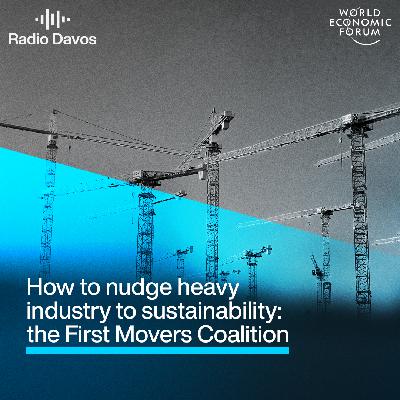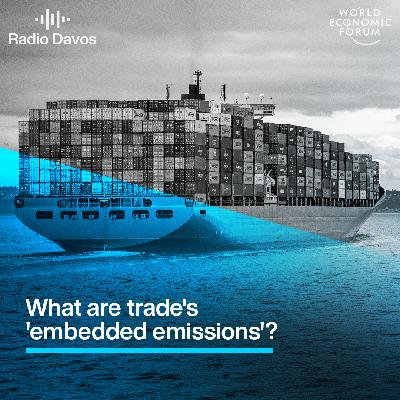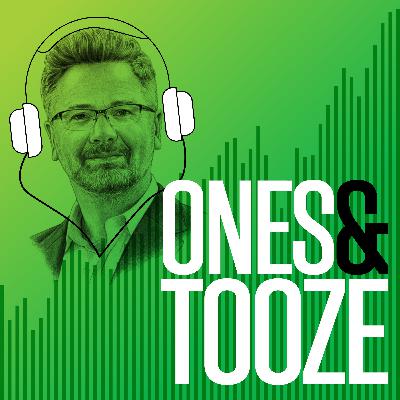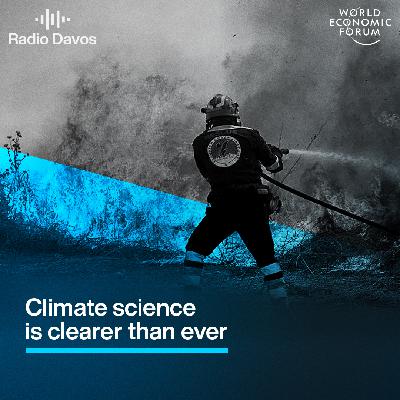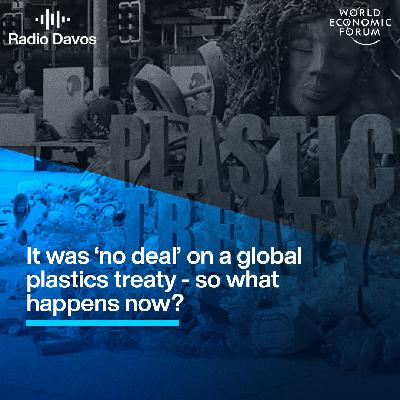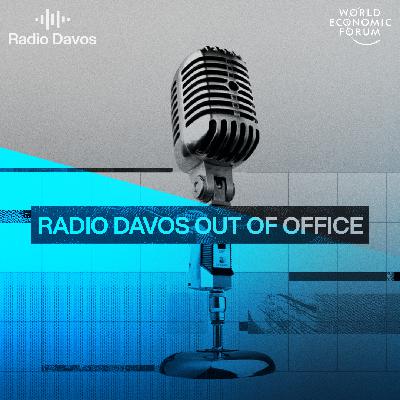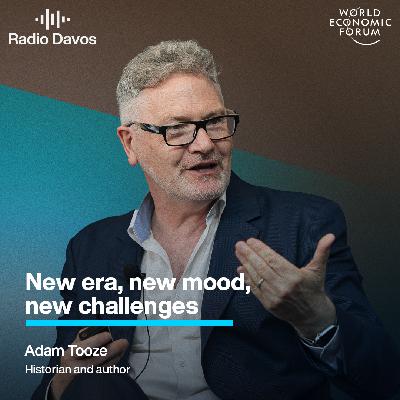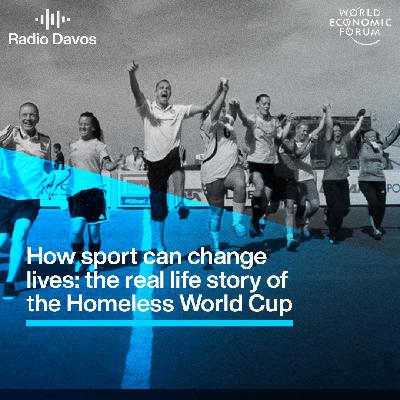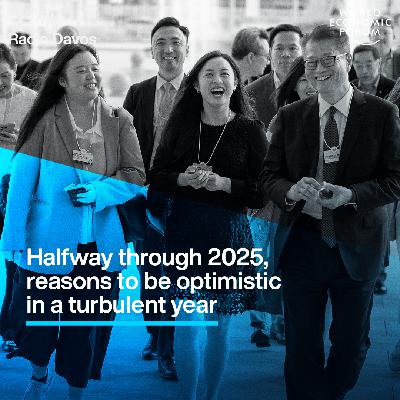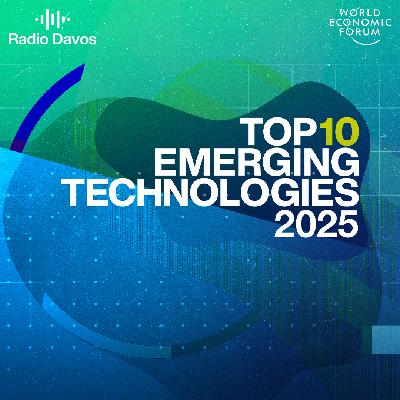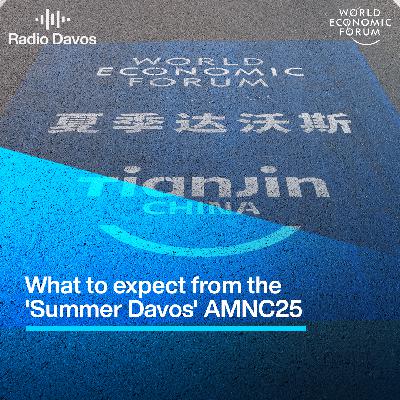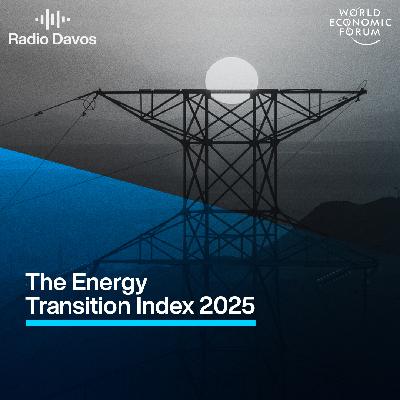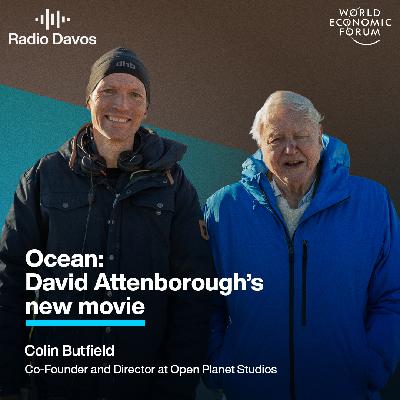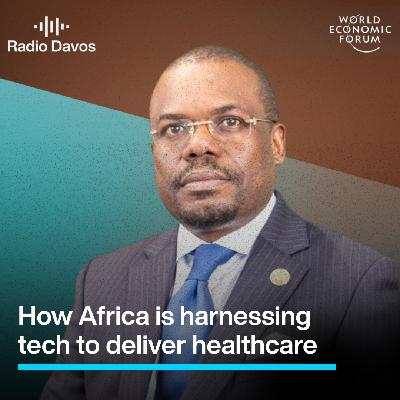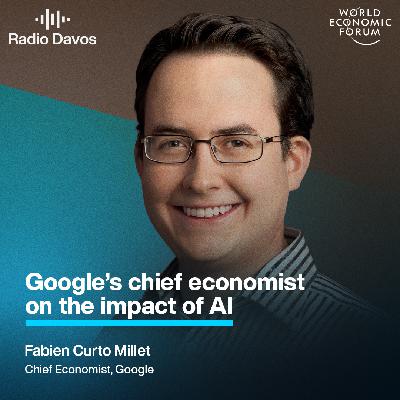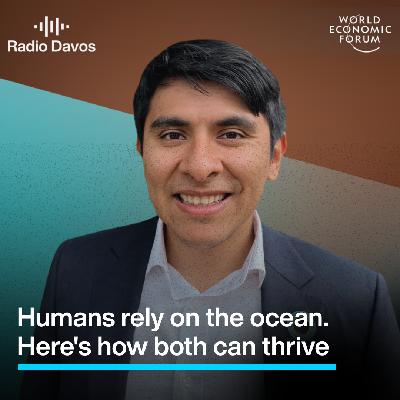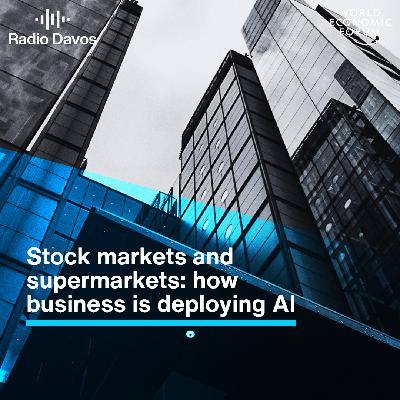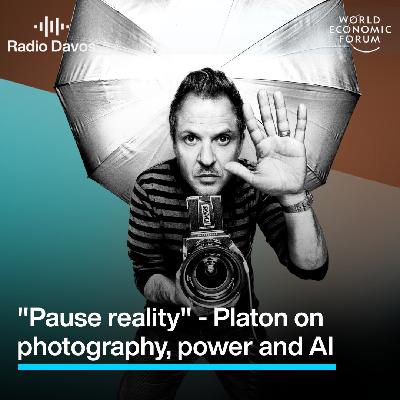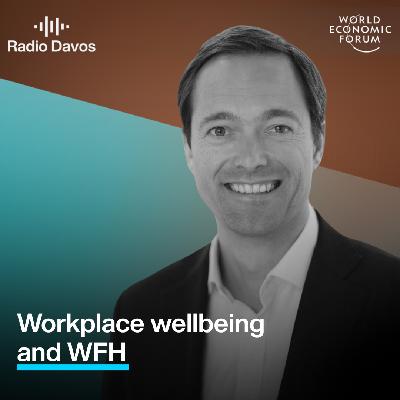Discover Radio Davos
Radio Davos

Radio Davos
Author: World Economic Forum
Subscribed: 391Played: 7,942Subscribe
Share
Description
How do we solve the world’s biggest challenges? From climate change to inequality; the rise of big tech and rapid changes in how we live and work. Radio Davos talks to the people who have the ideas, the passion and the power to make change happen in a way that benefits all of us.
271 Episodes
Reverse
Up to now, the vast majority of the world’s ocean was not governed by a global treaty that would protect this vital part of the planet from pollution or over-exploitation - meaning the high seas were something of a Wild West. But that is all changing. After years of negotiations, member states of the United Nations have agreed the High Seas Treaty, ensuring the protection and sustainable use of marine biodiversity of areas beyond national jurisdictions. Almost two-thirds of the planet’s surface is ocean and the seas make up 95% of the Earth’s total habitat by volume. But, only 1% of the high seas has, up until now, been under any protection protocol and just 39% of the ocean falls under the national jurisdiction of individual countries. Kristian Teleki, Director of Ocean Action Agenda and Friends of Ocean Action at the World Economic Forum tells us what is in the treaty and why it’s such a big deal for the planet. Find out more: Friends of Ocean Action Further listening: Subscribe on any platform: https://pod.link/1504682164 Join the World Economic Forum Podcast Club Get all our podcasts at wef.ch/podcasts. Radio Davos Agenda Dialogues Meet the Leader The World Economic Forum Book Club Podcast
Around the world, people are developing low-emissions technologies - but they can only succeed if there is market demand. In this episode, we hear how the First Movers Coalition helps create that market by getting big companies to invest in emerging technologies that aim to de-carbonise the 'hard to abate' sectors. And we meet the buyer and seller of low-emissions cement doing just that. Speakers: Noam Boussidan, Programme Head, First Movers Coalition Julia Fidler, Head of Materials and Fuels Decarbonisation, Microsoft Joe Hicken, Senior Vice President of Business Development and Policy, Sublime Systems Links: First Movers Coalition: https://initiatives.weforum.org/first-movers-coalition/home Check out all our podcasts on wef.ch/podcasts: YouTube: https://www.youtube.com/@wef Radio Davos - subscribe: https://pod.link/1504682164 Meet the Leader - subscribe: https://pod.link/1534915560 Agenda Dialogues - subscribe: https://pod.link/1574956552 Join the World Economic Forum Podcast Club: https://www.facebook.com/groups/wefpodcastclub
The European Union is implementing a 'Carbon Border Adjustment Mechanism' (CBAM) that will levy a fee on importing certain goods that are produced in countries that lack regulations forcing producers to cut their greenhouse gas emissions. It's an idea that other countries are considering, but is also hugely complex and may be challenged by exporter countries. Two expert guests explain the policy and its implications for business and global trade. Speakers: Aaron Cosbey, Senior Associate, International Institute for Sustainable Development (IISD) Dandy Rafitrandi, researcher at the Department of Economics, Centre for Strategic and International Studies (CSIS), Indonesia Kimberley Botwright, Head, Sustainable Trade, World Economic Forum (co-host) Links: World Economic Forum Centre for Regions, Trade and Geopolitics: https://centres.weforum.org/centre-for-regions-trade-and-geopolitics/home Emissions in trade: Where are they and how do we measure them?: https://www.weforum.org/stories/2025/03/emissions-in-trade-how-we-measure-them/ CBAM: What you need to know about the new EU decarbonization incentive: https://www.weforum.org/stories/2022/12/cbam-the-new-eu-decarbonization-incentive-and-what-you-need-to-know/ What future for climate and trade? Scenarios and strategies for carbon competitiveness?: https://www.weforum.org/publications/what-future-for-climate-and-trade-scenarios-and-strategies-for-carbon-competitiveness/ Countries must deal with imported emissions in a fair and flexible way: https://www.climatechangenews.com/2025/08/27/countries-must-deal-with-imported-emissions-in-a-fair-and-flexible-way/ European Commission on CBAM: https://trade.ec.europa.eu/access-to-markets/en/news/carbon-border-adjustment-mechanism-cbam International Institute for Sustainable Development: https://www.iisd.org/ Centre for Strategic and International Studies: https://www.csis.or.id/ Podcasts: Climate science is clearer than ever. How should companies respond?: https://www.weforum.org/podcasts/radio-davos/episodes/climate-science-policy-business-response/ It was ‘no deal’ on a global plastics treaty - so what happens now?: https://www.weforum.org/podcasts/radio-davos/episodes/plastics-treaty-inc5-gpap/ Tariffs, globalization, and democracy, with Harvard economist Dani Rodrik: https://www.weforum.org/podcasts/radio-davos/episodes/dani-rodrik-economics-globalization-tariffs/ The global economy 'at a crossroads' ahead of Davos: Chief Economists Outlook: https://www.weforum.org/podcasts/radio-davos/episodes/chief-economists-outlook-ralph-ossa-wto/ Check out all our podcasts on wef.ch/podcasts: YouTube: https://www.youtube.com/@wef Radio Davos - subscribe: https://pod.link/1504682164 Meet the Leader - subscribe: https://pod.link/1534915560 Agenda Dialogues - subscribe: https://pod.link/1574956552 Join the World Economic Forum Podcast Club: https://www.facebook.com/groups/wefpodcastclub
Welcome to this bonus episode of Radio Davos. A few episodes ago we interviewed author and historian Adam Tooze about geopolitics. Adam has his own podcast, Ones & Tooze, published by Foreign Policy where he is also a columnist. We thought we would pop an episode on the Radio Davos feed so you can take a listen. In this episode, Adam and his co-host Foreign Policy deputy editor Cameron Abadi, look at the state of global development. Radio Davos will be back very soon, in the meantime enjoy this episode of Ones and Tooze. Ones and Tooze show notes: Whither Global Development Some 10 years ago, the United Nations came up with its Sustainable Development Goals, a series of objectives for the world around alleviating poverty and protecting the planet. But these days, it's clear that very few of those goals will be met by the target date of 2030. What happened? And what does the Trump administration's retreat from international development mean for the world? On this episode of Ones and Tooze, a weekly economics podcast from Foreign Policy magazine, hosts Adam Tooze and Cameron Abadi dig in. New episodes of Ones and Tooze are released every Friday. Follow the show on Apple, Spotify, or wherever you listen. https://podcasts.apple.com/us/podcast/ones-and-tooze/id1584397047 https://open.spotify.com/show/44pekawcpIJ7KgwcFIgZDr https://foreignpolicy.com/podcasts/ones-and-tooze/ World Economic Forum podcasts: Check out all our podcasts on wef.ch/podcasts: YouTube: https://www.youtube.com/@wef Radio Davos - subscribe: https://pod.link/1504682164 Meet the Leader - subscribe: https://pod.link/1534915560 Agenda Dialogues - subscribe: https://pod.link/1574956552 Join the World Economic Forum Podcast Club: https://www.facebook.com/groups/wefpodcastclub
The politics might change, but the science is clearer than ever. The planet is warming - and even faster than predicted - due to the emission of greenhouse gases. Faced with the facts, where do businesses, policymakers, and the rest of us go from here? We get the latest in climate science from Johan Rockström, director of the Potsdam Institute for Climate Impact Research, and hear from Sumant Sinha, the head of India-based renewable energy company ReNew, on the outlook for business. The episode is co-hosted by Pim Valdre, head of the World Economic Forum's Climate Ambition Initiative and leader of the Alliance of CEO Climate Leaders. To watch the video-podcast, head to: https://www.youtube.com/@wef/podcasts Links: Alliance of CEO Climate Leaders: https://initiatives.weforum.org/alliance-of-ceo-climate-leaders/ Potsdam Institute for Climate Impact Research: https://www.pik-potsdam.de/en/home ReNew: https://www.renew.com/ Related podcasts: Can climate action survive geopolitical upheaval? Humans rely on the ocean. Here's how both can thrive Breathe! The cities working together on air pollution and climate change Check out all our podcasts on wef.ch/podcasts: YouTube: - https://www.youtube.com/@wef/podcasts Radio Davos - subscribe: https://pod.link/1504682164 Meet the Leader - subscribe: https://pod.link/1534915560 Agenda Dialogues - subscribe: https://pod.link/1574956552 Join the World Economic Forum Podcast Club: https://www.facebook.com/groups/wefpodcastclub
A second - and supposedly final - last round of talks to agree a global treaty to tackle plastics pollution this month ended with no deal. Clemence Schmid, director of the Global Plastics Action Partnership, tells us what happened and what might happen next. Links: Global Plastic Action Partnership: https://www.globalplasticaction.org/ Watch the World Economic Forum's documentary, "Invisible Warriors: The force behind Viet Nam’s plastic action": https://www.weforum.org/videos/invisible-warriors-the-force-behind-viet-nam-s-plastic-action/ Check out all our podcasts on wef.ch/podcasts: YouTube: - https://www.youtube.com/@wef/podcasts Radio Davos - subscribe: https://pod.link/1504682164 Meet the Leader - subscribe: https://pod.link/1534915560 Agenda Dialogues - subscribe: https://pod.link/1574956552 Join the World Economic Forum Podcast Club: https://www.facebook.com/groups/wefpodcastclub
The weekly podcast from the World Economic Forum that looks at the biggest challenges and how we might solve them is taking a summer break. We’ll be back in late August, but in the meantime check out the Radio Davos back catalogue - well over 200 episodes from the last five years, as well as our sister podcasts, Meet the Leader and Agenda Dialogues. You can find all of them wherever you listen to podcasts - including YouTube where an increasing number of episodes are full video-podcasts. Our webpage, with transcripts for most episodes, is wef.ch/podcasts. Please follow us on your favourite podcast app so you don’t miss an episode. Check out all our podcasts on wef.ch/podcasts: YouTube: - https://www.youtube.com/@wef/podcasts Radio Davos - subscribe: https://pod.link/1504682164 Meet the Leader - subscribe: https://pod.link/1534915560 Agenda Dialogues - subscribe: https://pod.link/1574956552 Join the World Economic Forum Podcast Club: https://www.facebook.com/groups/wefpodcastclub
Historian and podcaster Adam Tooze says we are at a turning point in history - as the Trump administration upends decades of assumptions on geopolitics, trade and the economy. Coinciding with the dawn of artificial intelligence, the rise of China, and demographic shifts are adding to transformative changes for us all. CNBC anchor Chery Kang joins us in the studio at AMNC25 to co-host the episode. This is a video-podcast, watch it on our YouTube channel: http://wef.ch/3GFeAvl Related podcasts: Halfway through 2025, reasons to be optimistic in a turbulent year Three experts on how to understand the USA Tariffs, globalization, and democracy, with Harvard economist Dani Rodrik Check out all our podcasts on wef.ch/podcasts: YouTube: https://www.youtube.com/@wef Radio Davos - subscribe: https://pod.link/1504682164 Meet the Leader - subscribe: https://pod.link/1534915560 Agenda Dialogues - subscribe: https://pod.link/1574956552
"The Beautiful Game" is a feelgood movie about a football tournament between teams of homeless people from around the world, with the upbeat message that sport can change, even save, lives. We speak to the man who created the real-life Homeless World Cup, an annual event aimed at lifting people out of homelessness. Guest: Mel Young, President of the Homeless World Cup Related podcats: The 90-year-old using sports to change the lives of refugees Check out all our podcasts on wef.ch/podcasts: YouTube: - https://www.youtube.com/@wef/podcasts Radio Davos - subscribe: https://pod.link/1504682164 Meet the Leader - subscribe: https://pod.link/1534915560 Agenda Dialogues - subscribe: https://pod.link/1574956552 Join the World Economic Forum Podcast Club: https://www.facebook.com/groups/wefpodcastclub
As we enter the second half of a turbulent 2025, we hear key lessons from the Summer Davos, AMNC25, and leaders from the World Economic Forum set out their priorities for the rest of the year where global collaboration is needed more than ever. Speakers: World Economic Forum: Sheba Crocker, head of Global Communications Group Saadia Zahidi, head of Centre for New Economy and Society Sebastian Buckup, head of Centre for Nature and Climate Mirek Dusek, responsible for the World Economic Forum summits Kiva Allgood, head of Centre for Advanced Manufacturing and Supply Chains Gim Huay Neo, head of Asia strategy Jeremy Jurgens, head of innovation and emerging technology Others: Eswar Prasad, Professor, Cornell University Adam Tooze, Director, European Institute, Columbia University Chinese Premier Li Qiang Kian Katanforoosh, Founder and Chief Executive Officer, Workera Hassan Elkhatib, Minister of Investment and Foreign Trade, Ministry of Investment and Foreign Trade of Egypt Lindsay Hooper, Chief Executive Officer, University of Cambridge Institute for Sustainability Leadership Catch up on all the action from AMNC25 at wef.ch/amnc25 and across social media using the hashtag #AMNC25. Listen to selected AMNC sessions on the Agenda Dialogues podcast. Forum reports mentioned in the podcast: Top 10 Emerging Technologies of 2025 Chief Economists Outlook Fostering Effective Energy Transition 2025 Forum initiatives mentioned in the podcast: First Movers Coalition Global Future Councils Technology Pioneers Uplink Related podcasts: What to expect from the 'Summer Davos' AMNC; and what the West gets wrong about China Tech poised to 'change the world': Top Ten Emerging Technologies 2025: https://www.weforum.org/podcasts/radio-davos/episodes/top-ten-emerging-tech-2025/ Getting sustainable, secure and equitable power to the people - how's the global energy transition going? “Trillions of dollars added to the economy” - Google’s chief economist on the macro impact of AI Stock markets and supermarkets: how business is deploying AI Beyond the hype, how industries are deploying AI at the heart of their operations
For the 13th consecutive year, the World Economic Forum has released its report on the top ten technologies set to change the world for the better. These technologies will speed our efforts to tackle everything from the energy transition to neurodegenerative diseases and more. Based on expert nominations and rigorous examination, the solutions drive home to leaders the increasing ways that technologies are converging and building on each other and showcase the importance of technology foresight as a key strategic tool to make meaningful change, integration and investment happen. Guests guiding us through this report for the fifth year include Bernie Meyerson, chief innovation officer emeritus at IBM, and Mariette DiChristina, Dean and professor of the practice of journalism at Boston University College of Communication. This interview was recorded in May 2025 in the New York office of the World Economic Forum. Top 10 Emerging Technologies for this year: - Structural Battery Composites - Collaborative Sensing - Green Nitrogen Fixation - Generative Watermarking - Engineered Living Therapeutics - GLP-1s for Neurodegenerative Diseases - Autonomous Biochemical Sensing - Next-Gen Nuclear Energy - Osmotic Power Systems - Nanozymes About this episode: Top 10 Emerging Technologies Report 2025: https://wef.ch/emergingtech25 These are the top 10 emerging technologies of 2025: https://www.weforum.org/stories/2025/06/top-10-emerging-technologies-of-2025/ Transcript: https://www.weforum.org/podcasts/radio-davos/episodes/top-ten-emerging-tech-2025 Mariette DiChristina, Boston University: https://www.bu.edu/com/profile/mariette-dichristina/ Bernie Meyerson: https://www.ibm.com/history/bernard-meyerson Related podcasts: Top 10 Emerging Technologies 2024: https://www.weforum.org/podcasts/radio-davos/episodes/top-10-emerging-technologies-2024/ Beyond AI: the top-10 tech of 2023 set to change our lives: https://www.weforum.org/podcasts/radio-davos/episodes/top-10-emerging-technologies-2023/
The Annual Meeting of the New Champions 2025 - AMNC25 - will bring together leaders from government, business and academia, along with innovators and representatives from international organizations, media and civil society. In this special episode produced in collaboration with Caixin Global, World Economic Forum Managing Director Mirek Dusek sets the scene for the 'Summer Davos' in Tianjin, China. And Jen Zhu Scott, founding partner of IN. Capital, gives an insider's view of China and its place in the world. Co-hosted by Li Xin, managing editor of Caixin Global. Catch up on all the action from AMNC25 at wef.ch/amnc25 and across social media using the hashtag #AMNC25. Links: AMNC25: https://www.weforum.org/meetings/annual-meeting-of-the-new-champions-2025/ Caixin Global: https://www.caixinglobal.com/ Related podcasts: Getting sustainable, secure and equitable power to the people - how's the global energy transition going? Stock markets and supermarkets: how business is deploying AI “Trillions of dollars added to the economy” - Google’s chief economist on the macro impact of AI Check out all our podcasts on wef.ch/podcasts: YouTube: - https://www.youtube.com/@wef/podcasts Radio Davos - subscribe: https://pod.link/1504682164 Meet the Leader - subscribe: https://pod.link/1534915560 Agenda Dialogues - subscribe: https://pod.link/1574956552 Join the World Economic Forum Podcast Club: https://www.facebook.com/groups/wefpodcastclub
The Energy Transition Index is the World Economic Forum's annual report on global efforts to get sustainable, secure and equitable energy to all. We hear from the Forum's Espen Mehlum, head of energy transition intelligence, and speak to two experts on energy in Africa and Latin America. Guests: Clarissa Lins, Founding Partner at Catavento, Brazil Andrew Herscowitz, CEO of the Mission 300 (M300) Accelerator Links: Energy Transition Index 2025: https://www.weforum.org/publications/fostering-effective-energy-transition-2025/ Check out all our podcasts on wef.ch/podcasts: YouTube: - https://www.youtube.com/@wef/podcasts Radio Davos - subscribe: https://pod.link/1504682164 Meet the Leader - subscribe: https://pod.link/1534915560 Agenda Dialogues - subscribe: https://pod.link/1574956552 Join the World Economic Forum Podcast Club: https://www.facebook.com/groups/wefpodcastclub
“Once you’ve truly seen the sea, you’ll never look at Earth the same way again.” David Attenborough has spent nearly a century on Earth, bringing the mysteries of nature to viewers around the world. In his latest film, Ocean, he shows how humans still have so much to learn about life below the waves and its vital contribution to life on land. One of the film’s directors, the naturalist Colin Butfield, tells Radio Davos about some of the revelations in the movie and the accompanying book that he co-wrote with Attenborough. Links: Friends of Ocean Action: https://www.weforum.org/friends-of-ocean-action/ Ocean movie: https://silverbackfilms.tv/shows/oceanwithdavidattenborough/ Related podcasts: Humans rely on the ocean. Here's how both can thrive: https://www.weforum.org/podcasts/radio-davos/episodes/ocean-marine-prosperity-areas/ Check out all our podcasts on wef.ch/podcasts: YouTube: - https://www.youtube.com/@wef/podcasts Radio Davos - subscribe: https://pod.link/1504682164 Meet the Leader - subscribe: https://pod.link/1534915560 Agenda Dialogues - subscribe: https://pod.link/1574956552 Join the World Economic Forum Podcast Club: https://www.facebook.com/groups/wefpodcastclub
Cuts to aid budgets are having a huge impact on the delivery of healthcare in Africa, the Forum's Lora du Moulin tells Radio Davos. And the head of Africa Centres for Disease Control and Prevention, Jean Kaseya, says why tech and regional collaboration give him hope for the future of the continent and the health of its people. Links: World Economic Forum Centre for Health and Healthcare: https://centres.weforum.org/centre-for-health-and-healthcare/home Africa Centres for Disease Control and Prevention: https://africacdc.org/ Regionalized Vaccine Manufacturing Collaborative: https://rvmc.net/ Check out all our podcasts on wef.ch/podcasts: YouTube: https://www.youtube.com/@wef Radio Davos - subscribe: https://pod.link/1504682164 Meet the Leader - subscribe: https://pod.link/1534915560 Agenda Dialogues - subscribe: https://pod.link/1574956552 Join the World Economic Forum Podcast Club: https://www.facebook.com/groups/wefpodcastclub
The World Economic Forum's latest Chief Economists Outlook highlights the risks posed by global trade tensions; and examines the potential impact AI will have on economic growth. Google's chief economist, Fabien Curto Millet, gives his take on the Outlook and the impact of GenAI, which he calls "the most exciting thing technologically I've seen in my lifetime". Links: Chief Economists Outlook May 2025: https://wef.ch/chiefeconmay25 Related podcasts: The global economy 'at a crossroads' ahead of Davos: Chief Economists Outlook: https://www.weforum.org/podcasts/radio-davos/episodes/chief-economists-outlook-ralph-ossa-wto/ Slow growth and the cost of debt: the World Bank's Chief Economist on the global outlook: https://www.weforum.org/podcasts/radio-davos/episodes/chief-economists-outlook-world-bank-indermit-gill/ The global economy is slowing - here's why that may not be such a bad thing: https://www.weforum.org/podcasts/radio-davos/episodes/chief-economists-outlook-september-2023-jerome-haegeli-swiss-re/ Check out all our podcasts on wef.ch/podcasts: YouTube: - https://www.youtube.com/@wef/podcasts Radio Davos - subscribe: https://pod.link/1504682164 Meet the Leader - subscribe: https://pod.link/1534915560 Agenda Dialogues - subscribe: https://pod.link/1574956552 Join the World Economic Forum Podcast Club: https://www.facebook.com/groups/wefpodcastclub
Humans rely on the ocean, not just for food, but for industries such as shipping, telecommunications, and renewable energy - as well as its vital role in absorbing carbon and regulating the climate. Is there a way to make our interactions with the ocean beneficial to the ecosystems? Alfredo Giron, head of Friends of Ocean Action, believes 'Marine Prosperity Areas' could do just that. Links: Friends of Ocean Action: https://www.weforum.org/friends-of-ocean-action/ Ocean Action Agenda: https://initiatives.weforum.org/ocean-action-agenda/home Marine Prosperity Areas: https://www.weforum.org/friends-of-ocean-action/marine-prosperity-areas-represent-a-new-hope-in-conservation/ Related episodes: Talks on creating a "Paris Treaty for plastics" just stalled - here's why, and what happens next How the 'Wild Wet West' was won: why the UN High Seas Treaty is big news What are the 'positive tipping points' that could help us accelerate out of climate disaster? Why the ocean is key to fighting climate change Summer special: sharks and tunes Check out all our podcasts on wef.ch/podcasts: YouTube: - https://www.youtube.com/@wef/podcasts Radio Davos - subscribe: https://pod.link/1504682164 Meet the Leader - subscribe: https://pod.link/1534915560 Agenda Dialogues - subscribe: https://pod.link/1574956552 Join the World Economic Forum Podcast Club: https://www.facebook.com/groups/wefpodcastclub
In the second of our series looking at how AI is being deployed across industry sectors, we look at financial services and consumer goods, with the head of London Stock Exchange Group and the chief strategy and transformation officer at PepsiCo. Guests: David Schwimmer, CEO, LSEG Athina Kanioura, Chief Strategy and Transformation Officer, PepsiCo Drew Propson, Head, Technology and Innovation in Financial Service, World Economic Forum Zara Ingilizian, Head, Consumer Industries, World Economic Forum Reports: Artificial Intelligence in Financial Services: https://www.weforum.org/publications/industries-in-the-intelligent-age-white-paper-series/financial-services/ Transforming Consumer Industries in the Age of AI: https://reports.weforum.org/docs/WEF_Transforming_Consumer_Industries_in_the_Age_of_AI_2025.pdf Previous episodes in this series: Beyond the hype, how industries are deploying AI at the heart of their operations Check out all our podcasts on wef.ch/podcasts: YouTube: - https://www.youtube.com/@wef/podcasts Radio Davos - subscribe: https://pod.link/1504682164 Meet the Leader - subscribe: https://pod.link/1534915560 Agenda Dialogues - subscribe: https://pod.link/1574956552 Join the World Economic Forum Podcast Club: https://www.facebook.com/groups/wefpodcastclub
Platon has photographed the most famous and powerful people of recent times, but his latest book is portraits of human rights activists, the poor and oppressed. In this interview, first published on Meet the Leader, he talks about the enduring power of photography in the age of AI, and why the most powerful people are often the most scared. This interview was first published on Meet the Leader. Watch it here: https://www.youtube.com/watch?v=AIUGFUza2ec&t=536s Read more: "Learn first, judge later" – photographer Platon on making portraits of dictators and the downtrodden: https://www.weforum.org/stories/2025/04/platon-the-photographer-of-power-and-the-powerless/ Related podcasts: Ballerina Misty Copeland: Unlocking potential and a leader’s most ‘vital’ role AI vs Art: Will AI rip the soul out of music, movies and art, or help express our humanity? Check out all our podcasts on wef.ch/podcasts: YouTube: - https://www.youtube.com/@wef/podcasts Radio Davos - subscribe: https://pod.link/1504682164 Meet the Leader - subscribe: https://pod.link/1534915560 Agenda Dialogues - subscribe: https://pod.link/1574956552 Join the World Economic Forum Podcast Club: https://www.facebook.com/groups/wefpodcastclub
Are you happy at work? And if so, do you think that helps you do the job better? Jan-Emmanuel de Neve, Professor of Economics and Behavioural Science at the University of Oxford’s Saïd Business School thinks so - and says he has the real-world evidence - from companies and millions of employees to prove it. He also says there is evidence that companies with a happy workforce will perform better for shareholders. And he answers the question - does that mean working from home is best, or should we all go back to the office? Links: Thriving Workplaces: How Employers can Improve Productivity and Change Lives: https://www.weforum.org/publications/thriving-workplaces-how-employers-can-improve-productivity-and-change-lives/ Future of Jobs Report 2025: https://www.weforum.org/publications/the-future-of-jobs-report-2025/ Why Workplace Wellbeing Matters: https://www.sbs.ox.ac.uk/news/jan-emmanuel-de-neve-launches-latest-book-workplace-wellbeing-and-why-it-matters Related podcasts: Wharton psychologist Adam Grant: How to rethink the work day - and the soft skill future leaders need: https://www.weforum.org/podcasts/meet-the-leader/episodes/adam-grant-skills-future-leaders-work/ The future of jobs requires a ‘skills-first’ mindset - for employers and for you: https://www.weforum.org/podcasts/radio-davos/episodes/skills-first-jobs/ Intel's HR chief on reskilling and building teams for the future: https://www.weforum.org/podcasts/meet-the-leader/episodes/christy-pambianchi-intel-ai-jobs-reskilling/ IKEA HR chief shares decades of career lessons learned and what’s needed to bridge the gender equity gap: https://www.weforum.org/podcasts/meet-the-leader/episodes/ulrika-biesert-ingka-group-gender-equity/ Check out all our podcasts on wef.ch/podcasts: YouTube: - https://www.youtube.com/@wef/podcasts Radio Davos - subscribe: https://pod.link/1504682164 Meet the Leader - subscribe: https://pod.link/1534915560 Agenda Dialogues - subscribe: https://pod.link/1574956552 Join the World Economic Forum Podcast Club: https://www.facebook.com/groups/wefpodcastclub
Comments
 United States
United States


